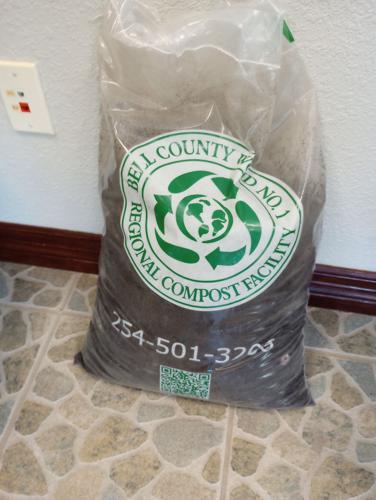Bell County water board approves $500K machine to help with composting
Published: Thu, 12/07/23
Bell County water board approves $500K machine to help with composting

Killeen Daily Herald
By Thaddeus Imerman | Herald staff writer
December 6, 2023
Employees of the Bell County Regional Compost Facility in southern Killeen will soon have a new piece of equipment with which to mix the compost materials.
During Wednesday’s board meeting for the Bell County Water Control & Improvement District No. 1, trustees unanimously approved the purchase of a new windrow compost turner for $571,800.
Wednesday’s vote was 6-0 with Killeen director Sandra Blankenship out of town.
Because funds are coming from the maintenance operation and replacement account, it will not affect the operating budget in the upcoming fiscal year, according to Ricky Garrett, general manager of Bell County WCID-1.
“Every month, $15,000 is transferred from the general revenues on the wastewater side to this fund for these types of purchases,” Garrett said during the meeting.
The new compost turner, which will come from McCourt Equipment in La Grange, will be used at the district’s Regional Compost Facility, 12302 State Highway 195, Killeen. The compost facility opened in 2011.
Daily, WCID-1 ships truckloads of bio solids, which contain human waste, from the wastewater treatment facility on 38th Street in Killeen to the compost facility, which is next to Killeen’s transfer station. The wastewater treatment facility on Chaparral Road transports bio solids to the compost facility two to three times a week, according to Garrett.
“We have to dispose of it,” Garrett said of the bio solids. “We have two avenues for that disposal. We have the compost operation and we have land disposal. In the last decade or two, it’s become more and more difficult for landowners to be permitted for land disposal; there’s obvious objections from the public.”
Garrett said the water district is fortunate to be able to pay a local landowner to dispose of 60 to 70% of the bio solids using land disposal.
Because there is bio solids left over, it is turned into compost material such as BioSelect, BioLoam, BioMulch, wood chips and topsoil.
Garrett explained at the meeting Wednesday that it is rare for a wastewater treatment facility to operate a composting endeavor in the black. In fact, it would be against the law for it to operate it for profit.
“It is not common practice for government to be in ‘for-profit’ and compete with retail businesses,” Garrett said. “In fact, there’s a statute — I don’t know if it’s federal or state — that prohibits governmental entities from engaging in an enterprise activity for profit if that same activity can be accomplished from the private sector.”
Because of the costs associated with wastewater treatment, Garrett said the main purpose of the composting facility is to help recover some of those costs.
Following the meeting, Garrett sent an email to the Herald describing the expenses and revenues from the compost facility in the past two years.
“Following up on the expenses and revenue, we finished 2021-2022 with $349,331 in expenses with $136,123 in revenue,” Garrett said in the email. “We finished 2022-2023 with $515,778 in expenses with $161,903 in revenue. So $213,208 deficit in 21-22 and $353,875 deficit in 22-23.”
During the meeting, Garrett referred to the costs of wastewater treatment and costs associated with disposing of bio products as an “Achille’s heel” of the water district.
For more information about the products the compost facility produces and the prices, go to http://compostfacility.org/